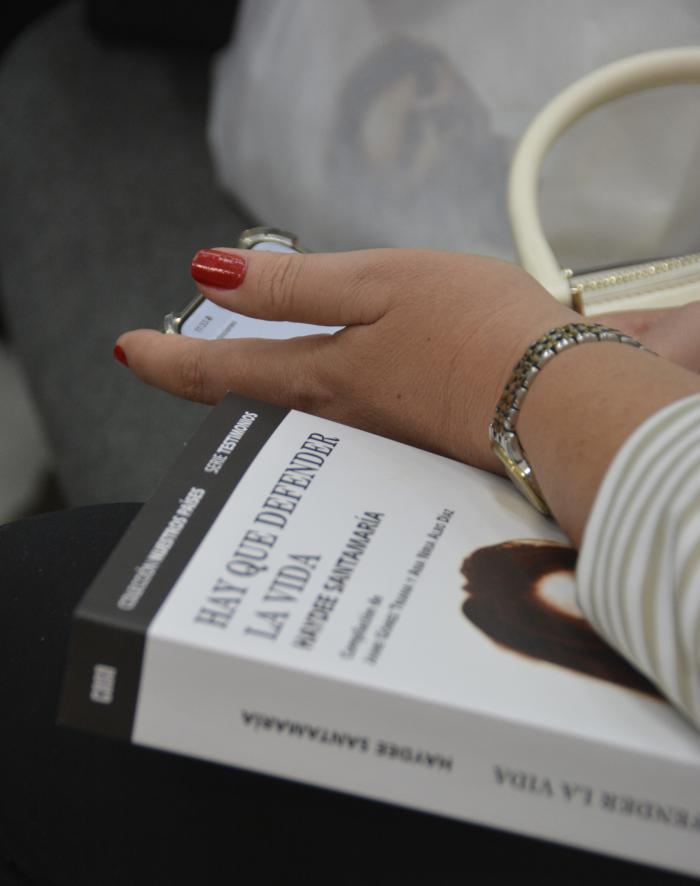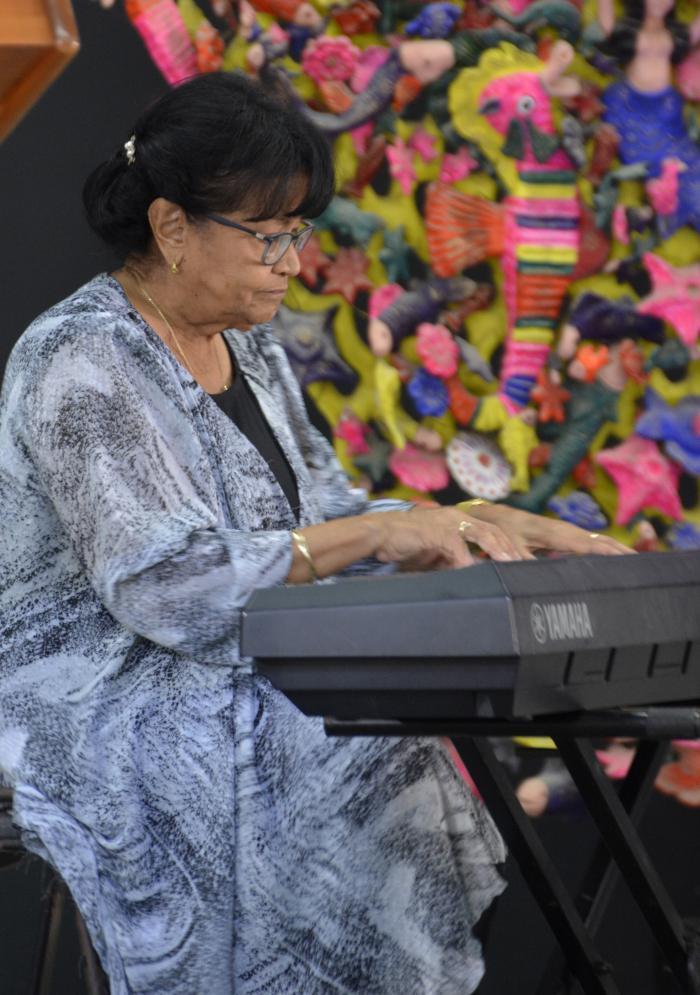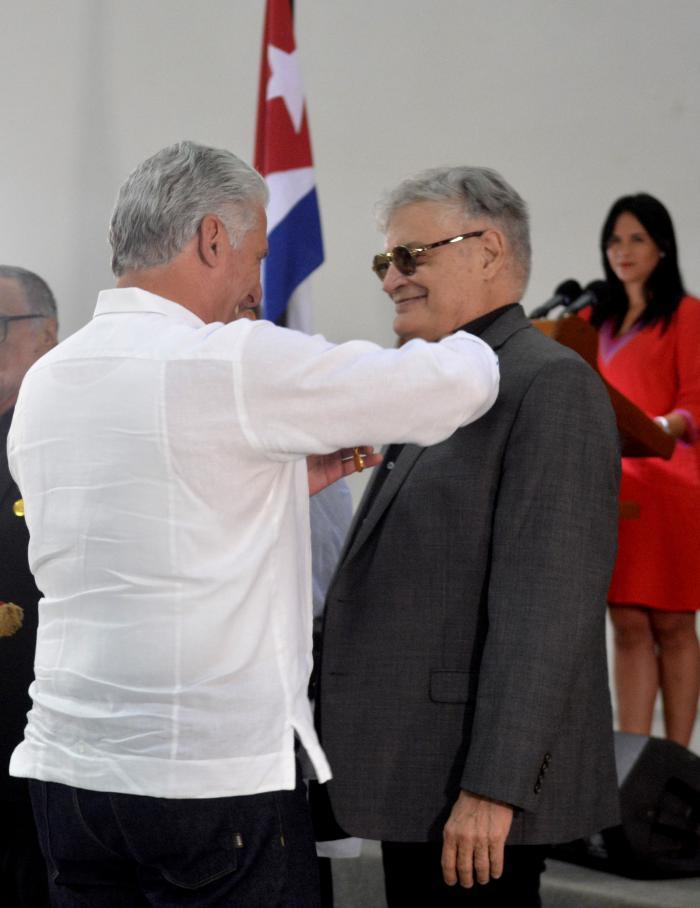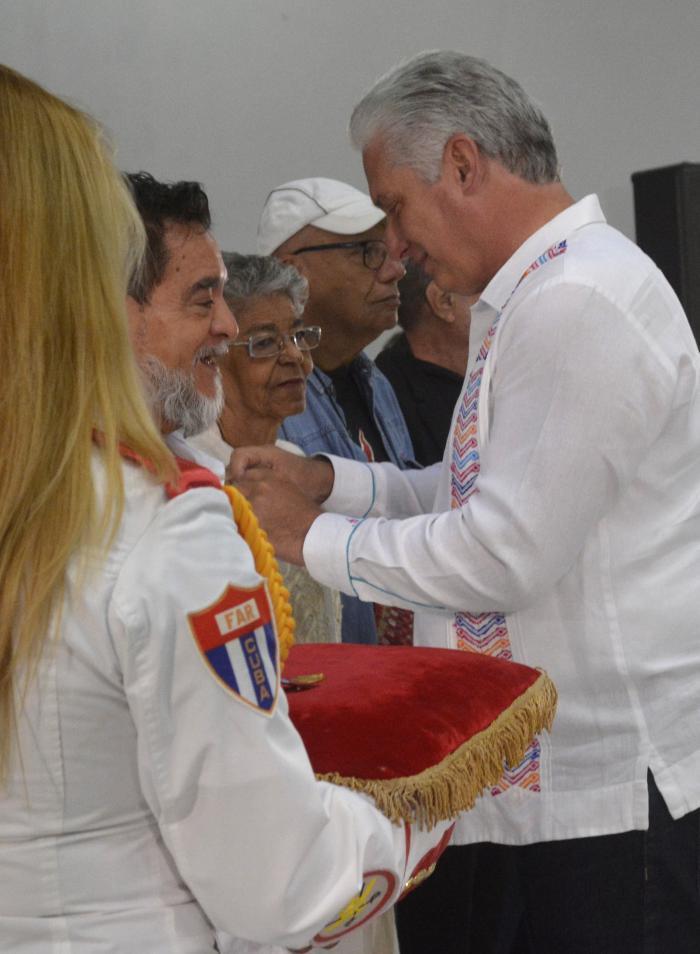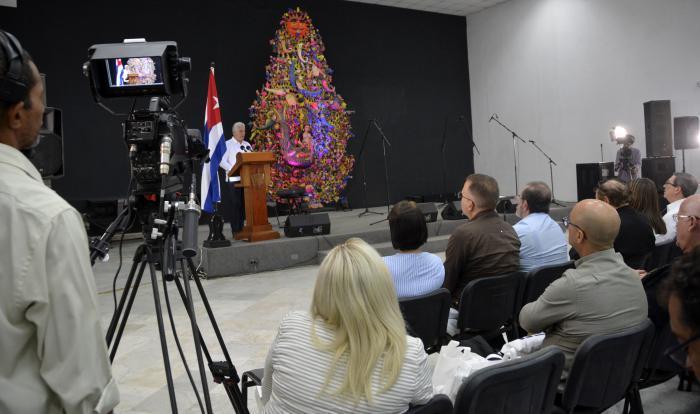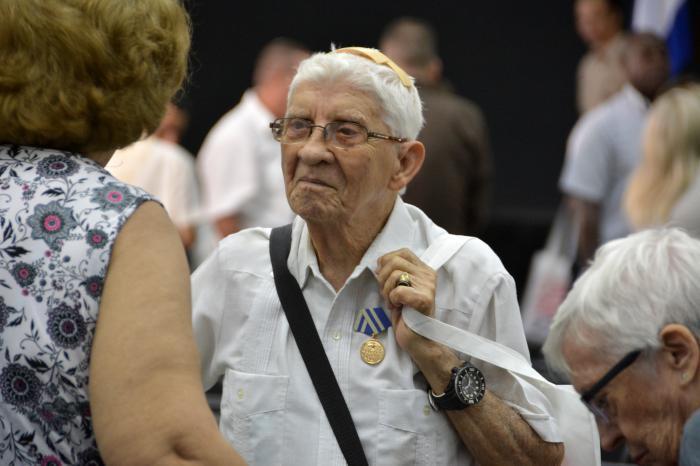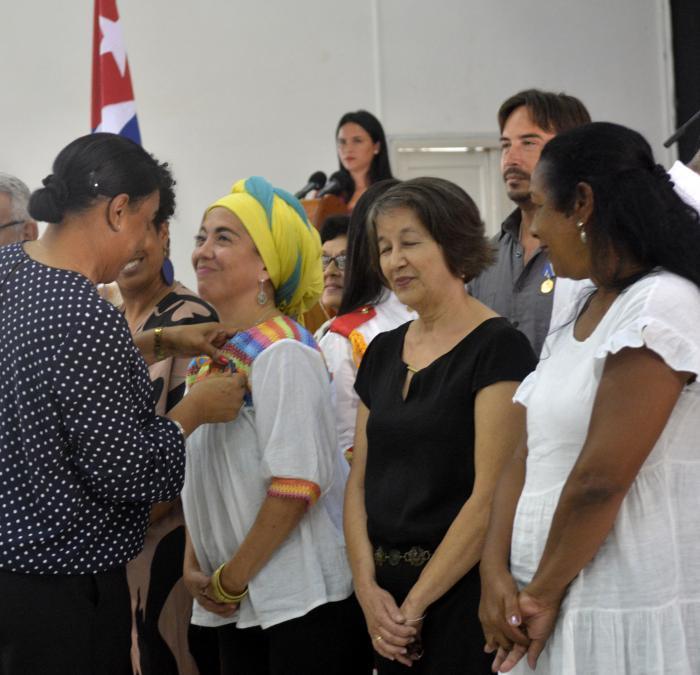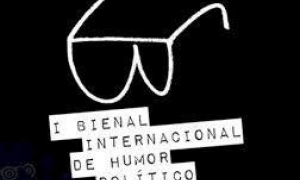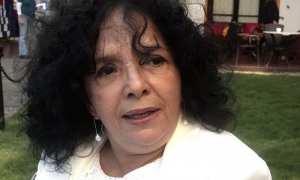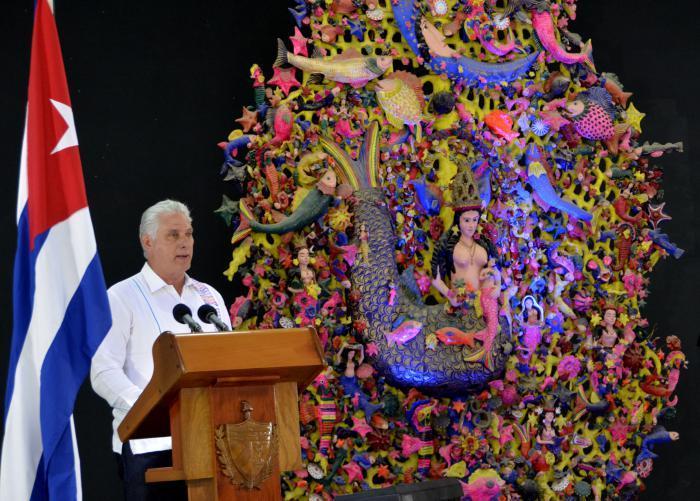
(Shorthand Versions - Presidency of the Republic)
Greetings to the comrades who live in Casa de las Americas (Applause);
Admired and dear recipients of today's award;
Distinguished guests;
Friends:
I greet and congratulate, first of all, the awardees this morning, and I especially thank Jorge Fornet for his emotional assessment of the significance of the 65-year work we are celebrating today, a magnificent, fair and beautiful essay on Casa de las Americas (Applause).
While Jorge was speaking, images of an endearing time came to my mind, when I was still a teenager and visiting Havana on vacation -I used to come to my aunt and uncle's house-, I always passed by here with the illusion of seeing Haydee Santamaria and any of the great Latin American names in literature, plastic arts or music, whom I came to think lived here after seeing them so much on Santiago Alvarez's ICAIC newsreels.
In my opinion, one of Casa's greatest merits and contributions is to have treasured works and memories of extraordinary value for our cultures, including the details of the singular origin of this home of the American soul, as told by Haydee to a group of Cuban workers in June 1974. (And I quote her revealing words:)
Haydee said in her revealing words:
"[...] I did not quite understand why I had to go there. I was not among the so-called personalities of art and literature, I didn't even have culture..."
"...It was a piece of house that looked like a church, and the people who were there then. I was there for two or three months and we changed the name, what was that Panamerican Colombian Society, well, let's change the name! Then they proposed several names and among those proposed there were very pompous names, and I chose Casa de las Américas.
"Those of us who were close to the comrades in this country who know what could happen, especially Fidel, were aware that the breakup of relations with Latin America was on the horizon, that we would have great conflicts, we already knew all that was coming. So I began to think that when we were isolated from our continent, it was important not to isolate ourselves from Latin American culture.
"...For me, on a personal level, it was distressing to think that we would be separated from the culture of our continent. I thought, and I still think, that the culture of our continent is fundamentally the same. And so I decided to stay at Casa de las Américas. I could not accept that because of the isolation we were going to suffer, one day our people would not know who our indigenous ancestors were, who were the writers and artists of our continent who had known how to express it in literary and artistic forms. I was worried that one day, in this country, our workers, having been isolated from our continent, would not know who Ricardo Palma of Peru or the Argentine Martin Fierro had been. For, although cultures may be called internationalist, there is no doubt that there are roots, and by isolation we may not know the roots of our wonderful culture, so deep and so beautiful (...) We cannot isolate ourselves from our culture, because we isolate ourselves from our politics, we isolate ourselves from Bolivar, we isolate ourselves from San Martin, we isolate ourselves from Marti. And if we isolate ourselves from them, we isolate ourselves from our culture, because they are an essential part of our culture as well".
I have begun with this long quote, because the history that follows those beginnings is so tremendous, that even those of us who have more years, more relationship and therefore more responsibility in defending and promoting Casa's work without rest, forget and even ignore many of those touching and essential details of her birth, until a commemoration like this anniversary gives us a good pretext to bring Haydee back to Casa, as Fornet has done before.
How was it that a woman who harshly defined herself as someone without culture, came to be respected, loved and honored, even after death, by some of the most prominent and dazzling authors of our language, as attested by that magnificent collection of letters gathered in the book Destino: Haydee Santamaría?
We must ask ourselves if sensitivity, humanism, passion and revolutionary commitment are not sufficient roots to nurture and give birth and flourish culture.
I think the answer lies in that phrase of his: "We cannot isolate ourselves from our culture, because we isolate ourselves from our politics". And it is in the fact that this criterion was expressed by one of the heroines of the Cuban Revolution not before an audience of artists and intellectuals gathered around the House, but precisely before a group of workers, in the CTC, a natural event only in the context of an authentic Revolution, as it happened and as Jorge recalled, when in these spaces were welcomed, as part of the family, the peasants who came to the first 26th of July in Havana.
Or when on September 11 of that foundational year a young guerrilla leader of only 28 years of age came to the House, dressed in his campaign uniform, Army General Raúl Castro Ruz, to speak at a lecture series organized by the Jose Antonio Echeverria Library. Raúl arrived at this same hall, which would later be called Che Guevara, and from here he launched his transcendent "Message of the Cuban Revolution", stating:
"We are a small country with a great responsibility. We are exploring the paths of the history of the new Latin American independence. Our Revolution, like a beacon of hope, casts its light on our brother countries. The Cuban Revolution -the Revolution of our small country-, has shaken two hundred million Latin Americans, has given them a new awareness of their strength and their destiny, has raised the feeling of Latin American solidarity and cooperation for the high ideals of liberation, progress and freedom, has set in motion new forces, has shown new experiences and discovered new possibilities.
"Latin America will find the means to come together and cooperate to accelerate its development and guarantee its freedom."
"Cuba is in the vanguard of that endeavor. We will not let the light of the Cuban Revolution be extinguished for the brotherly peoples of our America".
Paragraphs before, in that long and profound "Message of the Revolution", which Raúl released in the House, the Martian roots of the transcendental process opened by the revolutionary triumph in its Latin American projection is highlighted:
"When José Martí spoke of Our America, when he did not limit his homeland to our beloved islands, but considered himself the son and servant of all Our America, he surely had in mind this similarity of the evils that scourge us, of the enemies that attack us, of the dangers that threaten us.
"Ours is Martí, as ours are the priest Hidalgo, and the Indian Juárez, Bolívar and San Martín, Artigas and O'Higgins, Betances and Eloy Alfaro.
"We suffer for our ills and for the ills of all the brotherly peoples of Latin America".
The work of the Casa, since its inception, has been to promote the arts and literature of our region, to work for Latin American and Caribbean integration in the field of culture and to combat the colonial visions that have been imposed on the peoples and that have subsisted and been renewed for more than five centuries. Nothing could be more political and cultural at the same time. That is Casa de las Americas. And that is the Cuban Revolution.
The work oriented towards cultural emancipation and towards the unity that Bolivar and Marti dreamed of, was decisive, particularly when the governments of Latin America, with the exception of Mexico, broke -under the pressure of imperialism- with revolutionary Cuba.
Much later, in 2019, in a warm message of congratulations to Roberto Fernández Retamar and his team, Army General Raúl Castro Ruz highlighted, once again, the valuable contribution of the institution to the creation of "ties and channels of cultural exchange (for) among the peoples of Latin America and the Caribbean" and the promotion of "a Martí and anti-colonial vision among the creators of our region".
It was precisely the beloved and unforgettable Roberto Fernandez Retamar, who in his words for the thirty years of the institution, referred to the "spirit of service with which Haydee marked the Casa", considering decisive the personal spell of the heroine and "her unforgettable way of linking radical politics and humanist sensitivity", as well as "her conviction that the workers of the Casa are those who work in its premises as those who do it in other places and countries, their organic need for justice and beauty".
Among those "workers of the Casa" who supported many of its projects from other countries of the continent, there are creators who were brutally murdered by fascist dictatorships sponsored by imperialism to silence them and destroy the moral force of their ideas, such as Rodolfo Walsh, Paco Urondo, Haroldo Conti or Victor Jara.
Several intellectuals persecuted in their countries were welcomed in this House, where they initiated lines of work that still remain, such as Manuel Galich and the also vilely assassinated Roque Dalton. A beloved figure of the Casa, exiled in Cuba after the fascist coup, was Miria Contreras (Payita), a close collaborator of President Salvador Allende.
Casa de las Américas was also responsible for protecting the moving harpilleras of a creator like Violeta Parra, as loved by the popular sectors as she was hated by the ultra-right.
The Casa's Editorial Fund published essential authors of anti-colonial thought, such as Paulo Freire, Darcy Ribeiro, Pablo González Casanova, Adolfo Sánchez Vázquez, George Lamming or Roberto himself, author of inescapable essays, such as "Caliban". It is also no coincidence that the Casa has inaugurated its collection "Pensamiento de Nuestra América" with two important volumes of texts by Commander Ernesto Che Guevara.
Casa de las Américas brought us closer to Rubén Darío, Machado de Assis, César Vallejo, Pablo Neruda, Alí Primera, Eduardo Galeano, Santiago García, León Ferrari, Osvaldo Dragún, Ernesto Cardenal, Roberto Matta, Augusto Roa Bastos and other writers and artists of Our America.
If the Uruguayan Mario Benedetti created the Center for Literary Research of the Casa and the Guatemalan Manuel Galich the Conjunto magazine, of Latin American theater, we must remember the founding work of Cuban intellectuals and artists, such as Mariano Rodriguez, who was president of the Casa; Alejo Carpentier, who wrote the basis of the Literary Prize; José Lezama Lima, Pablo Armando Fernández, Harold Gramatges, Argeliers León, Umberto Peña, Eduardo Heras León and many others.
The Nueva Trova had its first home at Casa de las Américas, with Haydee's personal support. Here, in this hall, Silvio, Pablo and Noel Nicola played together for the first time, joined by Vicente, Eduardo Ramos and Martín Rojas. That highly original expression of our culture was connected with many other singer-songwriters summoned by the Casa, at the request of the American and Cuban filmmaker Estela Bravo, to participate in those Encuentros de la Canción Protesta (Protest Song Meetings).
Unforgettable among the transcendent actions of Casa, the First Meeting of Intellectuals for the Sovereignty of the Peoples of Our America in 1981. In the Final Declaration of the event, the participants committed themselves to confront the imperial machinery of lies and manipulations defending "truth, justice and beauty, and not in an abstract way, but with the decision and lucidity demanded and deserved by the original personality of our nations".
They seem like words written for today, when the ghosts of ordinary fascism emerge as dangerous caricatures of a past still too painful and too close to dismiss its vileness and its vocation of submission to imperial mandates.
Today I have cited essential authors whose lives and works deserve more space in the dissemination of anti-colonial thought. I owe much in the recognition of those works to the important support of the Casa and its current president, our dear Abel Prieto and part of his team, in the permanent and sharp criticism of the deep cultural crisis that the world is going through, led by savage capitalism to the fearful barbarism announced by Rosa Luxemburg.
It is not possible to forget that while here we celebrate that great cultural event that was the birth of our Casa de las Americas, Israel outrages the memory of its own people, massacring the Palestinians who survive in the rubble of Gaza. And the United States, after successive vetoes, refrains from voting for a cease-fire in the now useless United Nations Security Council, but approves billions of dollars to fuel wars, while brutally repressing students protesting the cynicism of their rulers and accusing others of their now undeniable disrespect for human rights.
There is no better tribute to all the intellectuals and artists who gave their lives and their works to the anti-fascist and anti-imperialist struggle promoted by the House, than to make common cause with those who today are fighting for the same ideals of social justice, peace and authentic freedom.
I do not want to end without dedicating a grateful greeting to the Jury of the Casa Award, which this year celebrates its 65th anniversary with us. We feel deep pride for hosting those who work intensely to keep this Award "anticolonial, Martiano, Calibanic, expression of non-negotiable attachment to culture", as Abel Prieto brilliantly defined it a few years ago.
I also embrace the comrades of different generations who have been decorated today and who are already part of the rich history of this institution, which has nurtured Cuban, Latin American and Caribbean culture.
I congratulate and embrace them on this day of such significance. I embrace each and every one of the Casa's workers and I ask them to maintain the mystique they inherited from Haydee, Roberto and the founders, which is the mystique of the Cuban Revolution.
Continue confronting the lies and manipulations of the empire and its mercenaries, and of the new fascism, with truth, justice and beauty!
Thank you very much (Applause).
